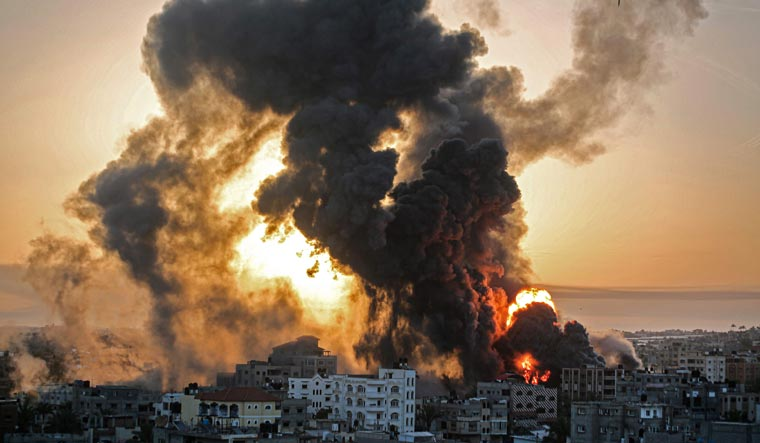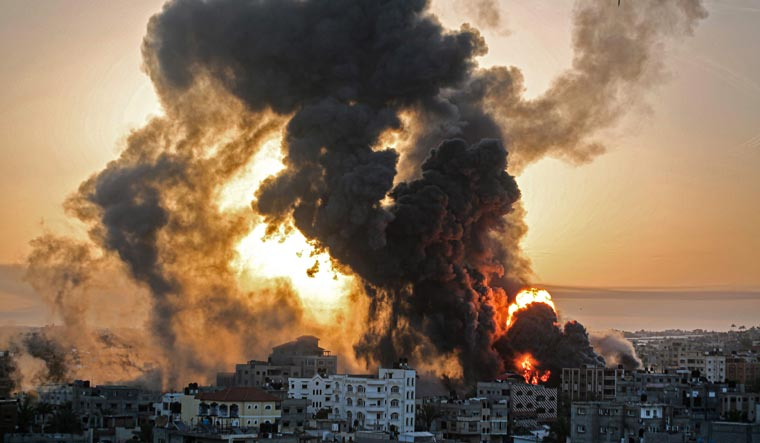Address
304 North Cardinal St.
Dorchester Center, MA 02124
Work Hours
Monday to Friday: 7AM - 7PM
Weekend: 10AM - 5PM
Address
304 North Cardinal St.
Dorchester Center, MA 02124
Work Hours
Monday to Friday: 7AM - 7PM
Weekend: 10AM - 5PM


War and clashes are once again taking place in Israel and the Palestinian Territories, in the worst outbreak of violence since 2014. Weeks of tensions have erupted in East Jerusalem following the planned eviction of Palestinian families from the Sheikh Jarrah neighbourhood by Israeli authorities for Israeli settlers to inhabit the area. This caused protests and demonstrations by the Palestinian population that have been met with harsh measures by the Israeli security forces. The evictions have been later postponed by two weeks by a last-minute court ruling but the situation has been spiralling out of control. On May 10th, the celebration of Jerusalem Day, commemorating the Israeli capture of the city in 1967, has been met by clashes between Palestinian protesters and Israeli police, who stormed the al-Aqsa Compound, the third holiest site of Islam, during the Ramadan prayers, using tear gas and rubber bullets against protesters and worshippers alike. Hamas has reacted to what it considered a “red line”, namely the presence of Israeli security forces in the shrine, issuing an ultimatum which has expired unobserved, following which thousands rockets have been launched from the Gaza Strip targeting Israeli cities and forcing Israeli authorities to close down Tel Aviv airport. Israel has responded launching a new operation, “Guardian of the Walls”, on the Gaza Strip, targeting it with air and artillery strikes and by deploying soldiers and tanks in proximity of the border. Thousands of reservists have also been recalled. Meanwhile starting on May 11th Palestinians and Israeli Arabs have been demonstrating across both Israel and the West Bank, with Jewish extremists taking to the streets as well in various cities, including Tel Aviv and Lod, where mob violence has taken place. Tensions have continued on May 15th, the Nakba Day, commemorating the displacement of hundreds of thousands of Palestinians following the foundation of Israel in 1948. At the time of writing the death toll reached 188 Palestinians and 10 Israelis killed, mostly caused by rocket and air strikes.
A degree of political uncertainty in both Israel and the Palestinian territories have contributed to stir up underlying tensions. Long-awaited elections in Palestine were first scheduled to take place in 2021 (legislative election on May 22nd, presidential election on June 31st and Palestine National Council election on August 31st), but were later postponed indefinitely, officially because the political and electoral process in East Jerusalem is subject to restrictions by the Israeli authorities. While unquestionable, there is also reason to believe that Palestinian President Mahmoud Abbas and his Fatah in the West Bank are unwilling to see their power contested. Fatah exerts exclusive control on the Palestinian national bodies and rules by decree, but it is also a corrupt and divided organisation, increasingly unpopular and unable to respond to Israel’s aggressive policies. Moreover, this prevents a constructive dialogue initiative and reconciliation with Hamas in the Gaza Strip, which, taking advantage of its counterpart’s weakness, now presents itself as the protector of Jerusalem and its holy sites. Thus, the Palestinians’ rage for the postponement of the first elections in fifteen years is directed at both Israel and the Palestinian National Authority. On the other hand, Israel has witnessed four elections (the last one on March 23rd) in the past two years, but long-standing Prime Minister Benjamin Netanyahu has not been able to form a government and currently faces corruption charges. Several rounds of talks have taken place between different parties but with no clear result, but it is likely that the current escalation will favour the incumbent leader. Tensions in the area may also have repercussions on the Abraham Accords achieved during the last months of the Trump administration and the normalisation of ties between Israel and four Arab countries, given that three of them, Bahrain, the United Arab Emirates and Morocco, have openly condemned Israeli actions.
The international community has been following the development in the area with apprehension and concern. Some countries, most notably Turkey and Jordan, have readily criticized Israel’s operations while many more have been demanding an end to the hostilities. All eyes were set to the United States and to how the Biden administration would respond to its first major foreign policy crisis. The US response has confused and disappointed many who hoped the new administration would take a harsher stance towards Israel than its predecessor. The United Nations Security Council (UNSC) has been meeting in the past days to call for an end to the violence but has been prevented from doing so by the United States, which in at least three different occasions has refused to participate in negotiations started by Norway and Tunisia to issue a statement critical of Israel and its evictions and demolitions in East Jerusalem. The UNSC has thus been unable to proceed since it requires the unanimity of its 15 members, the United States being the only one opposing the move. The US claimed that it was attempting a direct diplomatic approach to reach a de-escalation and that the involvement of the Council could jeopardise the endeavour. Frustrated by the American behaviour, four UNSC members, Norway, France, Estonia and Ireland, have issued their own joint statement. At the time of writing the Security Council was scheduled to meet again on May 16th. The United States has in the meantime asked that both sides de-escalate while condemning Hamas’ rocket attacks but not Israeli air strikes. The White House, the Pentagon and the Department of State have all expressed their support to Israel’s right to defend itself, with US President Joe Biden later adding that Palestinians have the right to live in peace and safety. Many US officials have engaged in a very active phone diplomacy, including a call between Biden and Netanyahu on May 12th, calls between Secretary of State Antony Blinken and National Security Advisor Jake Sullivan with their Israeli counterparts, with Qatar Minister of Foreign Affairs Mohammed ibn Abdulrahman Al Thani as well as officials from Palestine, Egypt and Jordan. Meanwhile, the Biden administration has sent Hady Amr, Deputy Assistant Secretary of State for Israel and Palestinian Affairs, to the region in an attempt to de-escalate the situation. It is also worth noting that Biden has yet to appoint a special envoy to the region as well as the US ambassador to Israel.
Biden himself is facing pressure from different sides as American politics itself is divided over the issue, with Republicans blaming the President for his inability to stop violent clashes in the area and what they see as a decline in American solidarity with Israel compared to previous administrations. The Democratic Party is split in opposing views, with the more conservative members, such as Representatives Debbie Wasserman-Schulz, Josh Gottheimer and Brad Sherman, supporting Israel, and the progressive wing condemning Israel’s conduct and criticizing Biden’s statements. Among the latter group, Representatives Ilhan Omar, Rashida Tlaib and Alexandria Ocasio-Cortez, as well as Senator Elizabeth Warren, have expressed their concern with Israel’s violations of Palestinian rights, with a group of 25 Democrats sending a letter to Blinken exhorting him to push for a halt to Israel’s evictions of Palestinians in East Jerusalem. The issue has also been raised of imposing sanctions on Israel for its violation of international law and human rights. This leads to what has long been perceived as US double standards and Washington’s efforts for a “rules-based system” when it comes to Russia and China, and its unwillingness to condemn Israel’s actions in the Palestinian Territories (evictions, displacements and colonial settlements) that have been deemed illegal under international law. These practices are regularly documented, making it increasingly difficult and awkward for the US to present itself as the defender of an international system based on human rights and the respect of norms, given Israeli disregard for both. American administrations have always refused to hold Israel accountable, while also blocking third parties’ efforts to recognise Israel as responsible for violations of international law. This has also fostered a culture of impunity among the Israeli political elites and a marginalisation of voices for peace.
The Jewish State, which receives $3,8 bn every year from the US – mostly in military aid – has always represented an exception when it comes to American foreign policy but the Biden administration, with its emphasis on human rights and norms, should be prepared to make no special cases. At a time when the United States is shifting its focus to the Asia-Pacific and de-prioritising the Middle East, a change of approach towards Israel is needed. Otherwise more violence and instability are going to plague the region, while evidence of US inconsistency and double standards when it comes to its allies will not be taken lightly by actors such as Russia and China.